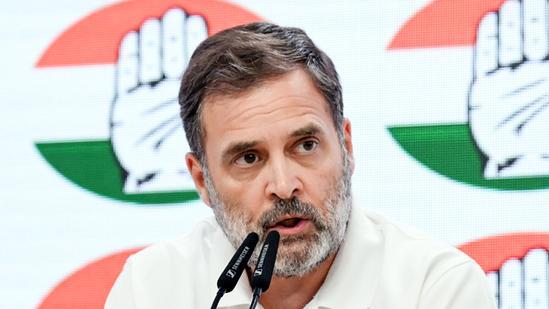
Rahul Excommunicated from Hinduism by Shankaracharya over ‘Manusmriti’ Remark
In a recent development that has sent shockwaves across the country, Jyotirmath’s Shankaracharya Swami Avimukteshwaranand Saraswati has formally excommunicated Congress leader Rahul Gandhi from Hinduism. The action was taken in response to Rahul’s remark on Manusmriti, a revered Hindu scripture. The Shankaracharya’s decision has sparked a heated debate, with many calling it an unprecedented move.
Rahul had made the remark while referring to the Hathras rape case, saying, “Where is it written in the Constitution that the culprit will roam free? This is written in your book Manusmriti.” His statement was widely criticized by Hindu leaders and organizations, who saw it as an attempt to belittle the sacred text.
Manusmriti is one of the most important Hindu scriptures, and it is considered a code of conduct for Hindu society. The text is attributed to the legendary sage Manu, who is believed to have written it around 1,200 BCE. The scripture deals with various aspects of Hindu life, including social norms, moral codes, and rituals.
The Shankaracharya’s decision to excommunicate Rahul Gandhi was announced on Tuesday, and it has been met with widespread reaction. The move has been seen as a serious offense by many, who believe that Rahul’s remark was an attempt to disrespect the sacred text of Hinduism.
Excommunication is a rare and serious punishment in Hinduism, usually reserved for individuals who commit grave offenses against the faith. The Shankaracharya’s decision is seen as a strong statement against Rahul’s remark, and it has raised questions about the limits of freedom of speech in India.
The Shankaracharya’s announcement was made during a press conference in Haridwar, where he said, “Rahul Gandhi has been formally excommunicated from Hinduism. His remark on Manusmriti was an insult to the sacred text, and it has hurt the feelings of millions of Hindus across the country.”
The decision has been welcomed by many Hindu organizations and leaders, who have been critical of Rahul’s remark. The Hindu Janajagruti Samiti, a prominent Hindu organization, has hailed the Shankaracharya’s decision as a “historic” move.
“We are extremely happy that the Shankaracharya has taken this step. Rahul Gandhi’s remark was an insult to our faith, and it was necessary to take action against him,” said the organization’s spokesperson.
However, not everyone has welcomed the decision. The Congress party, of which Rahul is a leader, has criticized the Shankaracharya’s move, saying that it is an attempt to muzzle dissent and suppress freedom of speech.
“This is a shocking and unprecedented move by the Shankaracharya. Rahul Gandhi was simply expressing his views on the Hathras rape case, and he has every right to do so,” said a Congress spokesperson.
The controversy has sparked a heated debate about the limits of freedom of speech in India. Many have argued that Rahul’s remark was an attempt to provoke and was not meant to be taken seriously. Others have said that the Shankaracharya’s decision is a draconian move that will stifle debate and dissent.
The controversy has also raised questions about the role of Hindu leaders and organizations in Indian society. Many have argued that the Shankaracharya’s decision is a reflection of the growing influence of Hindu nationalism in the country.
As the debate continues, one thing is clear: the Shankaracharya’s decision to excommunicate Rahul Gandhi has sparked a major controversy that is unlikely to die down anytime soon. The move has raised questions about the limits of freedom of speech, the role of Hindu leaders, and the future of interfaith dialogue in India.






